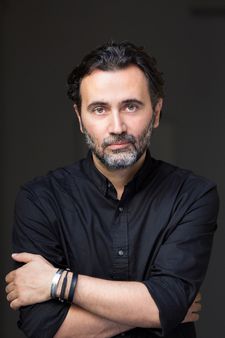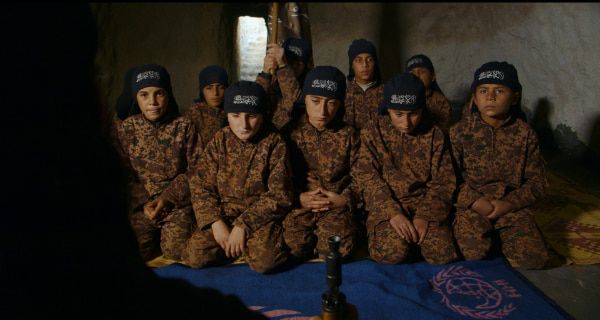 |
| Talal Derki: 'There should not be any more violence in houses, in school against kids, because they are the most sensitive and if violence happens, they will be broken' Photo: Basis Berlin |
It’s a risk that Syrian documentarian Talal Derki says was worth taking. He previously entered the Syrian warzone for his documentary Return To Homs and, in order to capture the footage for his latest, Of Fathers And Sons, he embedded himself with a radical Islamist family in Syria, to record the day-to-day life and the affect that the extremist views were having on the younger generation.
Sundance, where Of Fathers And Sons won the World Documentary Grand Jury Prize, Talal said: “Cinema should be there because this is the only way to tell what life looks like deeply from the inside, from the human part. In the news, they always have, I wouldn’t say propaganda, but their agenda. They always tell things in general. This won’t last for a long time.“If you look to film, for example, at Yugoslavia, that does not exist any more. I watched a lot of films, but I only get information about that war from a few films, otherwise I cannot see what the lives of people there looked like. For me, the movement of the Jihadists in my country was really the biggest shock I’ve ever had in my life. I cannot miss it, I had to take this risk. I know how to work, I made Return To Homs and made a lot of war reportage. So I know how to do it. It was, for me, easier than the film before.”
The risk may have been worth taking but, Derki – who now lives with his family in Berlin – admits that there was still an element of fear because of shooting undercover. “I was afraid most of the time because we built this concept that I was sympathetic to them,” he said, before adding, “I knew that I had no relatives in that location – they are all in Europe so they were all safe. So I could do something and, in the future, they won’t be able to punish one of my family who is still in the country. That was a power that made me feel secure, a freedom.”
Derki says that he decided to shoot Of Fathers And Sons while he was making his debut Return To Homs, which followed rebel fighters in the besieged Syrian City. During the filming of the first film, he found himself living for a week in a centre that belonged to ISIS.
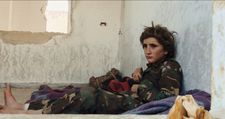 |
| Talal Derki: 'I noticed that Osama is always alone. The father is proud of him and makes the other kids jealous of him. But he is more sensitive' Photo: Basis Berlin |
The footage he collects is heartbreaking, showing how the children’s education is largely forgotten in a bid to ensure they adopt the same religious fervour of their parents, and how they are groomed to take up arms at a very young age. It’s a cycle of violence that seems hard to break and Derki admits one of the hardest parts was to stay aloof from the children and maintain his cover story that he was a war photographer, sympathetic to the Jihadist cause. “That was the difficult part,” he admits “The moment when Osama asked me: ‘What does Berlin look like? Is it like our village?’ They don’t know. They think the whole world looks the same. I said: ‘No, it’s different. There is no war there.’ But you cannot be so much what you are because kids speak so much. It’s not about him surviving. I thought about kidnapping him to some other place so that he will not be poisoned more, but this would never work. I’m playing a different role.
“Once they made a massacre in a village and all the media started saying: ‘Look what al-Nusra did.’ And they called me late at night and said: ‘Come with your camera, you have to help them get out of this.’ I went with them and I was looking like them. I was looking at those who survived the massacre and I saw in their eyes that they were afraid of me. I couldn’t whisper in their ear that everything was going to be okay, the bad will come to an end.
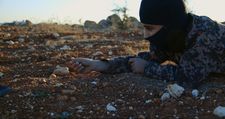 |
| Talal Derki: 'For me, the movement of the Jihadists in my country was really the biggest shock I’ve ever had in my life' Photo: Basis Berlin |
He also talks about the fear as he watched the children make ‘toy’ versions of landmines, which we then see them jumping on to make them explode. “When you are on the ground, this is what they do most of the time. If you film it, you cannot change it,” he said. “I asked them not to put so much acid in it, so that nobody would get hurt. But I really was afraid.
Above all, the film makes you think hard about what the future holds for a Syria where so many of the more moderate families have fled for their lives, so that only the radicalised remain.
“This is reality,” says Derki “This is the direction of that film. This is a story of Osama and his father and about the legacy of violence. For me, 100 minutes was the minimum I need to tell how it looks like and how you become what you are. How you change and how the child would resist the adult’s world.
“I noticed that Osama is always alone. The father is proud of him and makes the other kids jealous of him. But he is more sensitive. He lied to his father because he didn’t want to pray. You can’t ask kids to pray to God – which God? Kids understand things they see, they don’t understand this concept. But they have to pray. There is so much pressure, he cursed God. If you grow up here [in the West], you don’t need to curse God, He didn’t hurt you. He didn’t force you to do anything, well, let’s not say God, let’s say the people who use God.” The women of the family are noticeable by their absence and Derki says that, in the two-and-a-half years that he shot the film, he basically never saw her. “I asked him if I could use her voice, but he said, ‘It’s impossible’. You see his daughter, who is two-and-a-half years old and they hit her because she didn’t wear the hijab. That family are more radical than the radicals themselves.”
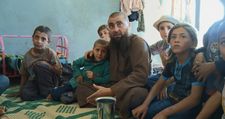 |
| Talal Derki: 'That family are more radical than the radicals themselves' Photo: Basis Berlin |
Derki acknowledges that travelling to Syria becomes increasingly dangerous for him as he becomes more well known.
He added: “It’s not necessary to do things about Jihad in a documentary/non-fiction way. If I want to do something about it, there are a lot of stories that are heartbreaking and that people don’t know about. I don’t only want to do Syria films. What’s most important as a filmmaker is to have an impact on people and to go deeper and deeper into the human side.”
I ask him what he hopes that people will take away with them after watching his latest documentary.
“I want people to really open their eyes to what is happening in Syria, to what has happened in Libya, in Iraq, Afghanistan. What the bombs bring with them. I believe we should interfere with the governments around the world, to be in the education part. The male authority in Muslim countries should end. There should not be any more violence in houses, in school against kids, because they are the most sensitive and if violence happens, they will be broken. This is the legacy of violence.
“Don’t put religion in their education, so they can grow up normally and decide. If they are educated and a civil war happens, then the people won’t tell the Jihadists to come. I want people to go on this journey with us and to understand that there’s a chance that your enemy in the future might not be your enemy, he could be your friend – there’s a chance to fix him before he takes this dark road.”
Of Fathers And Sons will play the True/False Film Festival in the US on March 2.








